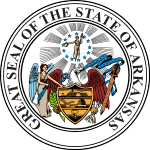Campaign
During Governor Clinton's reelection campaign, he pointed to efforts in pushing through strong education reform including competency tests for new and working teachers and raising pay for most of Arkansas teachers, using anger from the Arkansas teachers’ unions to his advantage. [4] Freeman attacked Clinton on not focusing on economic issues, pledging not to raise taxes and running the state government more like a business. [5] Freeman saw some high profile visits from prominent Republicans, including then President Ronald Reagan, who campaigned for Freeman. During a rally for the Reagan/Bush reelection campaign just days before election day Reagan told an audience, "Please send Woody Freeman to the Statehouse." [6] Former Secretary of State Henry Kissinger also campaigned for Freeman during the election but seemed to have little of substance to offer the Arkansas candidate, and Governor Clinton on the campaign trail attacked the visit saying that, "I hope Mr. Kissinger tells us everything he knows about what Arkansas needs, and I hope my opponent tells Mr. Kissinger everything he knows about what Arkansas needs in a utility contractor." [7]
This page is based on this
Wikipedia article Text is available under the
CC BY-SA 4.0 license; additional terms may apply.
Images, videos and audio are available under their respective licenses.





